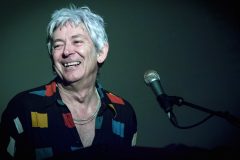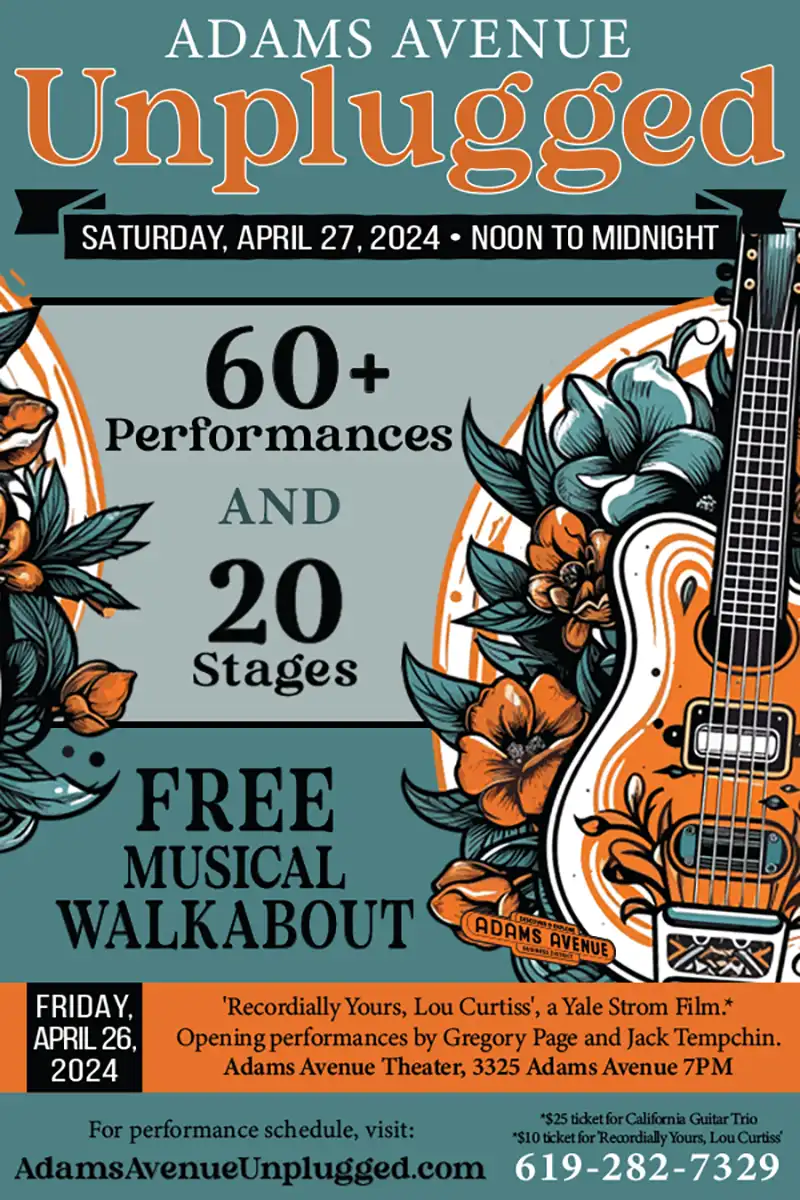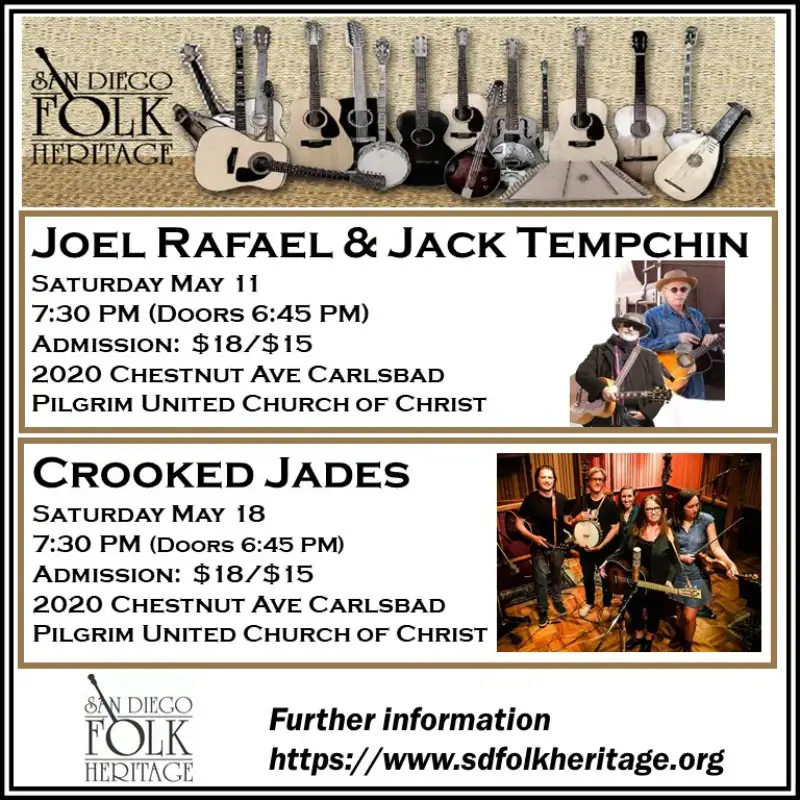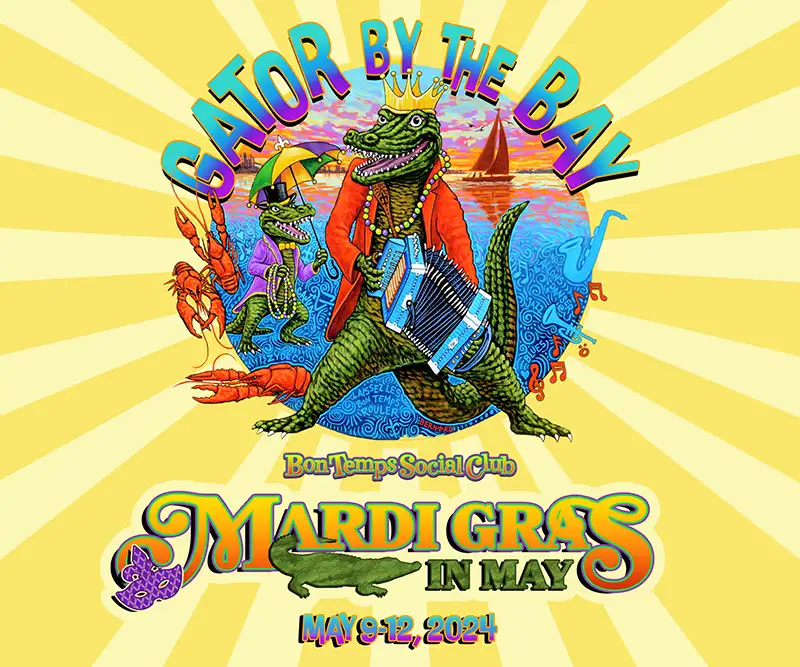Tales From The Road
Ian “Mac” McLagan: A Face Among Session Men

Ian McLagan
He never will forget at all
The day he played at the Albert Hall
A million sessions ago it seems
He is a session man
A chord progression
A top musician
— “Session Man,” The Kinks
Kinks leader Ray Davies’ 1966 ode to the unsung heroes of the concert stage and recording studio was about a very real session man and a musical giant who is still sorely missed nearly 20 years after his death: Nicky Hopkins. Name your favorite Beatles, Rolling Stones, or Who composition and chances are it featured keyboardist Hopkins tickling the ivories. After he left the UK for California, Hopkins remained a force — he even played on The Pursuit of Happiness album for San Diego’s Beat Farmers.
Hopkins left behind an astonishing body of work that few mortals have been willing to challenge. But Ian “Mac” McLagan is giving it his best shot — or piano pounding. Mac is best known for his keyboard performances with a band that showed the ’60s “Swinging London” scene in its best light: the Small Faces. His amusing anecdotes on all the sessions and live shows and the musicians he has rubbed shoulders with will make for a fascinating evening at the AMSD Concert series in Normal Heights this month.
The Stones, Chuck Berry, Bob Dylan, Bruce Springsteen, Melissa Etheridge, Bonnie Raitt, Paul Westerberg, John Hiatt, Frank Black, and Billy Bragg are among the eclectic music acts who have greatly benefited from Mac’s expertise. It all began for Ian William Patrick McLagan when he was born 68 years ago in Isleworth. As with so many English young people, McLagan became enamored with the wonderful and mysterious sounds emanating from “the Colonies,” in particular the gritty blues of Howlin’ Wolf, Muddy Waters, Sonny Boy Williamson, and Little Walter. One of his earliest bands was called the Muleskinners, and the fresh-faced English boys backed some of their American heroes during tours in the UK. After the Muleskinners disbanded, Ian joined the Boz People, a band fronted not by Boz Scaggs (who was actually touring and making music in Europe at the time) but by Boz Burrell. Burrell later had one of the most musically diverse careers, leaving the avant-garde progressive rock of King Crimson for the ultra-commercial Bad Company.
When the original Small Faces lineup of Steve Marriott, Ronnie Lane, and Kenney Jones oversaw a group member change with the departure of Jimmy Winston (due to financial disagreements), Mac was presented with his big break, giving the band a distinct keyboard sound that would be their trademark in the years to follow. They soon became the darlings of English pop culture: Fleet Street press paparazzi found them photographically charismatic; the Carnaby Street boutiques were proud to see the quartet pose in the latest fashions; and Vespa-riding Mods pursued the band from show to show.
The Small Faces were originally recording for the Decca label and managed by Don Arden, the tough-as-nails father of Sharon Osbourne. Frustrated by the lack of breathing room with the Arden management group and the poor earning receipts from big hits like “Hey Girl” and “All or Nothing,” the Small Faces searched for an artist-friendly environment. They found refuge by signing with Immediate Records, a new label created by Andrew Loog Oldham, whose remarkable publicity skills had as much to do with the initial success of the Rolling Stones as the musical contributions of Brian Jones. Mick Jagger, and Keith Richards. The Small Faces opened their umbrellas under a bright psychedelic sun and expanded upon their R&B sounds of the Decca years. Why “Itchycoo Park” finally broke the band in the US after years of futility remains a happy mystery. The song’s charming mixture of British music hall rhythms and the popular Sgt. Pepper sound effects of the day took America by storm.
Marriott, Lane, McLagan, and Jones stayed together long enough to release their own Sgt. Pepper take — an LP called Odgen’s Nut Gone Flake. Once all the talk regarding the album cover design (it looked like an old tobacco tin box) died down, listeners were delighted to hear an innovative recording that featured a narration by English comedian Stanley Unwin, a master of nonsensical “goobledygook” chatter. The public buzz of an anticipated 1968 New Year’s Eve concert ended on a sour note when Marriott left the stage in haste. When the smoke cleared, Marriott formed Humble Pie. The leader of Small Faces was replaced by two members of the Jeff Beck Group: guitarist Ronnie Wood and a Sam Cooke-inspired vocalist named Rod Stewart. The Small Faces became simply the Faces.
Although it appeared on some nights that the wheels were going to go off the tracks, the Faces’ propensity for hotel room demolitions and consumption of spirits did nothing to impact the ticket sales of sold-out concerts or the presentations of gold record awards. For many years, Stewart walked the narrow tightrope of being the Faces’ front man and one of the most recognizable solo recording artists of the ’70s. Eventually, he would leave the Faces for the latter.
Since 1994, McLagan has made his home in Austin. He has a regular Thursday engagement at Lucky’s Lounge with his group, the Bump Band. In 2012, the Small Faces/Faces were inducted into the Rock and Roll Hall of Fame. Unfortunately, two of the original Small Faces were not able to join McLagan and Jones in the celebration. Marriott was killed when his cottage in England caught on fire in 1991; Lane died in 1997 after a gallant battle with multiple sclerosis. Embracing the same ethic as Eric Burdon, Mac is a “working musician” and loves performing. He wrote his biography, All The Rage: A Riotous Romp Through Rock and Roll History, in 2000, and produced the Faces’ anthology, The Best of Faces: Good Boys… When They’re Asleep. Mac’s current CD is called Never Say Never.
With his lust for life undiminished by time, Mac spoke to the Troubadour by phone from Austin.
San Diego Troubadour: Hi Mac. How will the upcoming solo show in San Diego differ from your live dates with your full band?
Ian McLagan: Well, I come with half the band — it’s me and my bass player, Jon Notarthomas. I start the show on my own with the piano, play a few songs, tell a couple of silly stories. Then I bring Jon on and tell some even more annoying stories and play some more songs. It’s nice to have him. He plays bass and guitar; he sings so well; it’s like doubling me, you know? I like just being able to talk between songs, whereas when I’m with the band, I don’t really like to do it much. I tell a few stories, I have my books to sell, so I kind of incorporate that into the show, really. I’m taking it as it comes, and if (the audiences) have any questions, I’ll have some stories. I just have fun, basically!
SDT: Whenever I meet someone from your generation, I always inquire about the impact of World War II. I always felt the British beat music movement occurred because the young people wanted to experience life on their own terms. England had suffered so much and the youth had this pent-up energy…
IM: I was born (four) days after V-E Day, May 12, 1945. So I don’t remember much about Hitler [laughs]. But if you looked out the back window of our house, there was a house 50 yards away where the chimney had been taken off by something during the war. I lived on the west of London near Heathrow Airport, which back then didn’t exist. The Germans were more concerned [about bombing] the East End, where the Small Faces came from. But there were bomb sites everywhere. In fact a Ronnie Lane song — which I’ll probably play in San Diego — is about his dad walking around amongst the debris in a bomb site, looking for something he could sell. That was quite a common thing when I was a kid. You would go up to London and there would be streets that had disappeared. But you might find bicycle handlebars or something. In fact, the bomb sites became playgrounds for kids, and it was a sad day for us when bit by bit they all got built on. But it took years and years, you know? Germany recovered very, very quickly. We would tour Germany in the middle ’60s and you would see where a whole street had been bombed out but they were already rebuilt. And London hadn’t been rebuilt at all, really. It was very slow.
We had rationing and I’m not sure when it was finished. I was at least six or seven years old. It’s really strange: now when I drink orange juice, it always tastes kind of fake, because the “real” orange juice was the “concentrated something” — I don’t know how they made it. We used to get it in these small bottles, and you treasured it because you couldn’t get orange juice at all at first.You couldn’t get bacon, you couldn’t get chicken. My mum was Irish, and we she would go home to Ireland and come back with bacon wrapped around her waist and sausages in her bag [laughs]. We kind of had it better than some of the families.
SDT: What were some of your earliest musical influences?
IM:Â Well, Muddy Waters was one of the first. I loved Buddy Holly… I started off with Buddy Holly, Little Richard, Fats Domino. I never heard Chuck Berry for some years. You know, Chuck Berry didn’t have hits in England. It was all about Elvis. Bill Haley was the first, with “Rock Around the Clock” and “See You Later, Alligator.” It was before I got to hear the original “See You Later, Alligator” [by Bobby Charles]. After that, there was drought— Pat Boone and all the English crap that was just watered down. And Elvis went soft. Thank God for the Beatles and Stones! I was a Stones follower; I used to watch them in clubs. I was in a blues band at that point, but we weren’t as good as the Stones. The Stones were the ultimate blues cover band. They would cover Jimmy Reed, Howlin’ Wolf, Muddy Waters, Chuck Berry, Bo Diddley. All the bands in England and all the little bands around London realized that if the Stones could do it, well, so could we. And that was our take on it. The Stones are still doing it, God bless them. They were in LA a few weeks ago. And I just saw Paul McCartney a couple of weeks ago in Austin. Unbelievable show, just incredible!
SDT: One of your early blues groups, the Muleskinners, backed Howlin’ Wolf. What was that like?
IM:Â Oh man, we were so lucky! We were so into [the agency] Marquee Artists, who booked most of the really good bands. They helped to bring over Buddy and Little Walter and Sonny Boy Williamson. They would have different bands backing them. Like, the Yardbirds were the band backing Sonny Boy. But if they weren’t available, then it would be the Authentics. If the Authentics weren’t available — hello! — here come the Muleskinners [laughs]. We backed Sonny Boy twice and we backed the Wolf three times, and we backed Little Walter once, too. I’m a huge Little Walter fan and was then. But it was a very strange Sunday afternoon when we backed him up. And he wasn’t in the happiest of moods. He was tired; he must had been jet-lagged to hell. But the kid who brought him to our rehearsal dressing room — just acoustic guitars and his harp — said, “Imagine you’re slaves on a chain gang.” As if to get us into the mood of being black! It was unbelievable, and we were shocked to our skin! And Little Walter looked around and said, “Shut the [expletive] up and get the [expletive] out of here!” He screamed at the kid, who had been the guy who had driven him there. He threw him out. And then he apologized to us, which was the strangest thing and we were so embarrassed. But because of that, he kind of warmed [up] to us. He was wonderful, he just wasn’t in the greatest shape at the time. But he played beautifully by the way. What a great artist — I’d put him up there with Louis Armstrong. I love his voice, love his songs, love his harp playing. He was a story teller like Sonny Boy — he could make it up as he went along.
SDT: The Beatles represented the collective youth of the world. But what made the Small Faces interesting — particularly from an American perspective — was that you were the group most identifiable with the Mods. Consequently, you were placed in the position of being sort of the musical spokesmen for a youth movement. Did that put additional pressure on Steve, Ronnie, you, and Kenney?
IM:Â No, we never really thought about it like that, really. We were just the happiest four guys; we just all loved to play. In the Muleskinners, I used to book and organize the gigs, and it was really a struggle to get one or two gigs a week. And with the Boz People, we had an agent, we had work — but they were too lazy to do it, and the van kept breaking down. As soon as I met Steve, Ronnie, and Kenney, they picked me up and it was like these guys love music, and they didn’t want to stop playing. We were the happiest people on the planet. Nobody could be happier than us. We had everything — we had musical instruments, we had gigs, and once we finished a gig, we listened to music in the car. Then we’d go back to the house we were all living in, and we would just start playing.
SDT: On a sad note, Steve and Ronnie have been gone for quite some time. What were they like as people and bandmates?
IM:Â Well, like I said, the moment I met Kenney, Ronnie and Steve, they picked me up and they laughed because they hadn’t met me before and they didn’t know I was going to be short. All they knew was that I played Hammond organ well, because they read a review where they had a picture of Boz Burrell by mistake but with my name under the picture. They hired me without actually hearing or seeing me. But they laughed because I was short like them [laughs]. It wasn’t a prerequisite, you know? They were my brothers instantly and Kenney is still my brother and Ronnie and Steve are — but they’re not with us. Ronnie became my best friend. Steve was just a character, he was a very funny guy. He was incredibly brilliant, amazing guitarist, the most amazing singer — I couldn’t believe it. I saw them on TV before I met them. My dad pointed them out and said, “Here, look at this band, they’re really good.” And I couldn’t believe it. Steve’s voice! My dad pointed at Ronnie Lane and said, “He looks like you.” And I said, “Yeah, he does!”
A few months after that, I quit the Boz people and I didn’t know what I was going to do. A friend of mine said, “Oh, you should join the Small Faces.” And I said, “Yeah, that will never happen.” And the next morning, I got a call and the next evening I was a member. It was the strangest thing…
SDT: Well, it was the ’60s, it was a time of possibilities.
IM:Â Yeah! That’s why I moved to America. A country of possibilities!
Ian McLagan will play at AMSD Concerts on Saturday, July 20. Contact www.amsdconcerts.com for ticket information.







